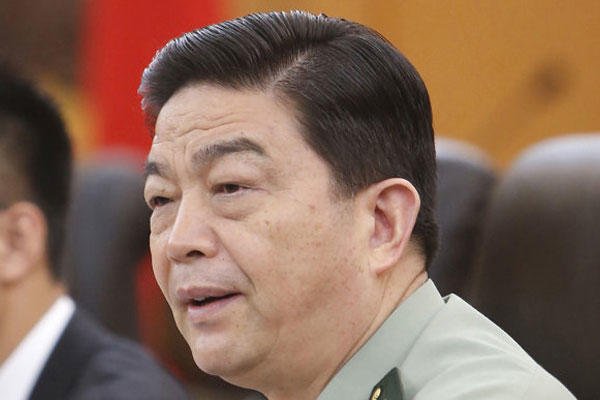China's new defense minister, Gen. Chang Wanquan, firmly rejected U.S. charges that Beijing was behind cyber-attacks on U.S. industry and government systems, and also expressed concerns Monday about the intent of the U.S. re-balance of forces to the Pacific.
"China is one of the prime victims of hacker attacks in the world," Chang said in refuting charges made by Defense Secretary Chuck Hagel and other top U.S. officials. "It has always been the Chinese government's position to make peaceful use of cyberspace."
At a security conference in Singapore in June, Hagel said "the United States has expressed our concerns about the growing threat of cyber intrusions, some of which appear to be tied to the Chinese government and military."
However, at a joint press briefing with Hagel at the Pentagon, Chang said "the Chinese military has never supported any form of cyber-attack. We oppose having any kind of arms race in the cyber-domain."
Chang, accompanied by more than a dozen military aides, was making his first visit to the U.S. since taking over at the Ministry of National Defense earlier this year in what was seen as a move by President Xi Jinping to boost the pace of China's rapid military modernization.
Both Hagel and Chang repeatedly stressed the need for the development of "mutual trust" between Washington and Beijing, but Chang said the so-called "Pacific pivot" by the U.S. raised concerns about the U.S. taking sides in China's disputes with Japan, Taiwan, South Korea, Vietnam and the Philippines over contested islands.
"The Pacific is a wide enough ocean for both countries," Chang said through a translator, and "always the Chinese position has been to welcome the U.S. to play a constructive role in the Pacific." Chang noted the recent joint military exercises the U.S. held with regional allies saying "this kind of intense military activity further complicates tension in the region."
"China is a peace loving nation. We hope that this strategy does not target a specific country in the region," Chang said. "But no one should fantasize that China would barter away our core interests."
Similar remarks by other Chinese leaders and China's expanding naval and missile capabilities have touched off an arms race in the region as other nations boost their own defense spending to counter China. Earlier this month, India launched its first aircraft carrier and Japan launched what it called a destroyer – an 813-foot ship capable of handling 14 helicopters on its flight deck.
Neither Chang nor Hagel mentioned China's recent naval exercises with Russia or China's four-day, live-fire exercises on the East China Sea that began last week to mark the anniversary of Japan's defeat in World War II.
In separate military drills, China's first aircraft carrier, commissioned late last year and named the Liaoning, embarked on a 10-day mission in the Bohai Sea off northeast China.
Despite emerging differences, Chang and Hagel pledged to increase cooperation between the two militaries in joint naval exercises and humanitarian and disaster relief efforts.
In an unexpected move, Chang also pledged that "the People's Liberation Army was ready to assist the U.S. in the search for those missing in action" from Vietnam, Korea and World War II by opening Chinese archives to U.S. researchers.
In his private talks with Chang, Hagel said he stressed the need to "sustain a substantial military-to-military relationship" and insisted that "the U.S. welcomes and supports the rise of China."
On the disputed islands in the region, Hagel repeated Washington's long-standing U.S. position that the U.S. takes no sides on sovereignty, but "we do have an interest in these claims being resolved peacefully."
Chang, dubbed one of the "top future world leaders to watch" by the Brookings Institution, has been a driving force behind the re-making of the People's Liberation Army into a modern fighting force.
He has headed China's manned space program and strategic missile development. He has also backed the transformation of China's navy from a coastal defense force into a "blue water" navy now seen as a threat by its neighbors.
Chang, 64, is a full member of the Chinese Communist Party's Central Committee. Unlike most of China's military leaders, who tend to come from powerful families in the major cities, Chang is said to be a farmer's son from central Henan province.
In the space program, Chang supervised the successful mission to send China's first woman astronaut, Maj. Liu Yang, into space to dock the Shenzhou-IX spacecraft with the experimental Tiangong-1 space station. The DF-31A intercontinental ballistic missile has also been deployed during his tenure.
To bolster U.S.-China miitary relations, Hagel and Chang agreed to arrange a series of high-level visits for top commanders.
Gen. Ray Odierno, the Army's chief of Staff, and Gen. Mark Welsh, the Air Force chief of Staff, were expected to go to China later this year while Adm. Wu Shengli, head of the chinese Nnavy, would visit the U.S.
Gen. Martin Dempsey, the chairman of the Joint Chiefs of Staff, has also invited Gen. Fang Fenghui, chief of the general staff of the People's Liberation Army, to come to the U.S., Hagel said.


























